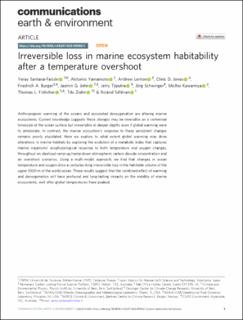| dc.contributor.author | Santana-Falcòn, Yeray | |
| dc.contributor.author | Yamamoto, Akitomo | |
| dc.contributor.author | Lenton, Andrew | |
| dc.contributor.author | Jones, Chris D. | |
| dc.contributor.author | Burger, Friedrich A. | |
| dc.contributor.author | John, Jasmin G. | |
| dc.contributor.author | Tjiputra, Jerry | |
| dc.contributor.author | Schwinger, Jörg | |
| dc.contributor.author | Kawamiya, Michio | |
| dc.contributor.author | Frölicher, Thomas L. | |
| dc.contributor.author | Ziehn, Tilo | |
| dc.contributor.author | Séférian, Roland | |
| dc.date.accessioned | 2023-11-24T11:54:02Z | |
| dc.date.available | 2023-11-24T11:54:02Z | |
| dc.date.created | 2023-10-12T22:49:57Z | |
| dc.date.issued | 2023 | |
| dc.identifier.citation | Communications Earth & Environment. 2023, 4 (1), . | en_US |
| dc.identifier.issn | 2662-4435 | |
| dc.identifier.uri | https://hdl.handle.net/11250/3104534 | |
| dc.description.abstract | Anthropogenic warming of the oceans and associated deoxygenation are altering marine ecosystems. Current knowledge suggests these changes may be reversible on a centennial timescale at the ocean surface but irreversible at deeper depths even if global warming were to ameliorate. In contrast, the marine ecosystem’s response to these persistent changes remains poorly elucidated. Here we explore to what extent global warming may drive alterations in marine habitats by exploring the evolution of a metabolic index that captures marine organisms’ ecophysiological response to both temperature and oxygen changes, throughout an idealised ramp-up/ramp-down atmospheric carbon dioxide concentration and an overshoot scenarios. Using a multi-model approach; we find that changes in ocean temperature and oxygen drive a centuries-long irreversible loss in the habitable volume of the upper 1000 m of the world ocean. These results suggest that the combined effect of warming and deoxygenation will have profound and long-lasting impacts on the viability of marine ecosystems, well after global temperatures have peaked. | en_US |
| dc.language.iso | eng | en_US |
| dc.rights | Navngivelse 4.0 Internasjonal | * |
| dc.rights.uri | http://creativecommons.org/licenses/by/4.0/deed.no | * |
| dc.title | Irreversible loss in marine ecosystem habitability after a temperature overshoot | en_US |
| dc.title.alternative | Irreversible loss in marine ecosystem habitability after a temperature overshoot | en_US |
| dc.type | Peer reviewed | en_US |
| dc.type | Journal article | en_US |
| dc.rights.holder | © The Author(s) 2023 | en_US |
| dc.description.version | publishedVersion | en_US |
| cristin.ispublished | true | |
| cristin.fulltext | original | |
| cristin.qualitycode | 1 | |
| dc.identifier.doi | 10.1038/s43247-023-01002-1 | |
| dc.identifier.cristin | 2184277 | |
| dc.source.journal | Communications Earth & Environment | en_US |
| dc.source.volume | 4 | en_US |
| dc.source.issue | 1 | en_US |
| dc.source.pagenumber | 14 | en_US |
| dc.relation.project | Norges forskningsråd: 294930 | en_US |
| dc.relation.project | EC/H2020/820989 | en_US |
| dc.relation.project | Sigma2: nn9560 | en_US |
| dc.relation.project | Sigma2: ns9560 | en_US |

